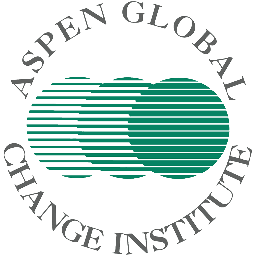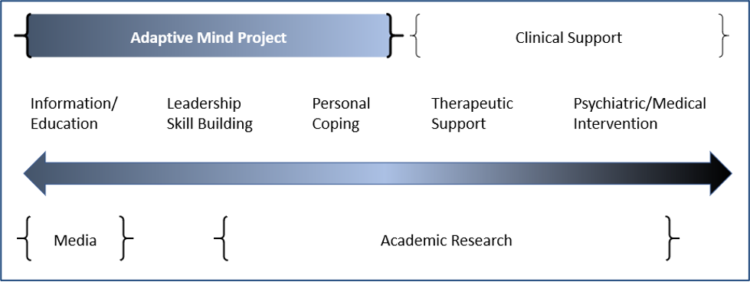
Aspen Global Change Institute
2017 – $15,000 The Adaptive Mind Project
The Adaptive Mind Project
Understanding and Building the Capacity to Deal with Constant,
Traumatic and Transformative Change
Project Summary
Climate adaptation professionals, resilience planners, and community leaders informing and implementing climate adaptation must perform their essential work in the context of accelerating change, disruption and the breakdown of interrelated life-support and human systems. The focus of this transdisciplinary project is to identify the components of psychosocial resilience in the face of constant, traumatic and transformative change – the Adaptive Mind – and develop support at scale for these leaders through training, peer support programs, and other resources.
Motivation
Every day, scientific evidence and lived experience demonstrate the unfolding reality of accelerating, traumatic and transformational impacts of climate change. COVID-19, racial violence, economic disruption and increasingly apparent governance failures combine with climate crises to harshly convey the many and linked stressors that resilience-building efforts must address. Few, if any, in public offices, social and environmental service organizations and other institutions where the resilience workforce is situated have been formally trained to deal with these massive challenges and conditions of breakdown. And yet, accelerating change and disruption circumscribe the outlook for these professionals. Increasingly, the resilience workforce recognizes that we are headed into a world of (1) constant, accelerating change, marked by uncertainty, surprises and even outright not-knowing, (2) frequently direct or vicarious traumatic experiences, and (3) often transformational change (Moser et al. 2017). Grief, anxiety, fear, anger, depression, despair, overwhelm, and hopelessness vis-à-vis climate change are increasingly afflicting experts, communities and their leaders (Gilford et al. 2019). There is a pressing need to foster self-care and skill-building in the resilience workforce to support leaders as they lead their organizations and communities through transformational challenges (Moser 2020).
Work Accomplished During the Seed Phase
Our work, conducted with support from The Seed Fund prior to COVID-19, reveals already high percentages of respondents who are working in climate change adaptation reporting burnout (80% among surveyed practitioners). Responses also revealed widespread emotional distress and the impulse to leave these demanding jobs despite deep personal commitments to this work. The pandemic, its economic consequences and increased awareness of systemic racism are likely to have exacerbated this situation. The predominantly female resilience workforce is additionally burdened with child/elder care, already causing some to leave their jobs. Those who will be called on to lead and support communities in this uncertain future need insights, training and support to do so well while maintaining their humanity, especially as they may also live in the same communities they serve. By not addressing the role of psychosocial resilience or investing in professional training and peer support, organizations face decreased productivity, health impacts, staff attrition and weakened morale.
Additional work accomplished with initial seed funding include:
- Dozens of presentations and panel contributions to raise awareness of the psychosocial demands and needs among resilience professionals
- Numerous media interviews on the mental health impacts of climate change on professionals
- Submission of several funding requests to foundations and government funding agencies
- Collection of relevant literature
- Compilation of selected resources for interested professionals
- Extensive networking with relevant experts, potential project advisors, and beneficiaries
- Expanded definition of the Adaptive Mind as skill-building for effectively dealing not just with climate change but the multi-stressor world in which resilience professionals do their work
Taking the Adaptive Mind Forward
- Continued fundraising
- Experimentation with (virtual) personal resilience-building group processes
- Continued collection and review of relevant literature
- Team-internal education and discussion of relevant insights and expertise
- Ongoing team-building
- Once funded, the project will be launched in full, including
- survey and interview research to better understand components of the Adaptive Mind
- an expert workshop and synthesis of what is understood about Adaptive Mind skills and capacities
- development of trainings and resources
- initiation of peer-learning and support groups within established professional networks
- continued outreach to foster employer acceptance of the need to foster and maintain the wellbeing of their employees and institutionalization of Adaptive Mind skill-building
More Information
A 2-page Project Summary
A 2-page Hand-out with personal resilience resources
Project Partners
- Susanne Moser, Ph.D. (lead)
Susanne Moser Research & Consulting, Antioch University New England &UMass-Amherst
- James Arnott, Ph.D. (co-lead)
Aspen Global Change Institute & University of Michigan
- Kristen Goodrich, Ph.D. (co-lead)
Tijuana River NERR
- Carol Berzonsky, Ph.D. (core team)
Antioch University New England
- Theopia Jackson, Ph.D. (core team)
Saybrook University
- Margaret Krebs (core team)
Earth Leadership Program, Stanford University
- Elizabeth Rohring (core team)
National Sea Grant Program
- Kristen Baja (core team)
Urban Sustainability Directors Network
- Lily Swanbrow-Becker (core team)
Independent, and American Society of Adaptation Professionals




